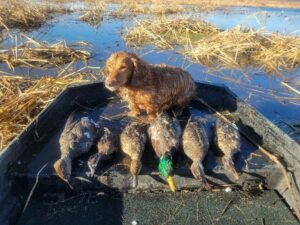An article from WWA’s Words From The Wardens.
This article originally appeared in Wisconsin Waterfowl Association’s October, 2023 eNewsletter.
 By Lt. Tyler Strelow/Mississippi River Warden Team
By Lt. Tyler Strelow/Mississippi River Warden Team
Waterfowl hunters have a well-earned reputation as some of the most conservation-minded hunters in the sport. Waterfowl hunters deservedly pride themselves on knowing and following the laws, and even calling others out when they see a violation happening.
As DNR wardens, we value this partnership and shared dedication to our natural resources, as it benefits the entire state.
As the season ramps up, it seems the right time to review Wisconsin’s laws about game retrieval to ensure all of us the same page out in the field!
Wisconsin’s Retrieval Law Not Uniform Nationwide
Because Wisconsin has incredible waters and wildlife, it is common to meet hunters from other states, or even other countries, while hunting our woods and waters. If this ever happens to you, keep in mind that their laws may not be the same as ours, and you may find yourself being the educator. Here are some helpful tips for remembering, and maybe even explaining, our state’s retrieval laws.
In Wisconsin, we do not have a wanton waste law like many other states. We do, however, have a law that requires the retrieval of killed and crippled game. This law states that it is illegal to kill or cripple any game bird without making every reasonable effort to retrieve the bird in question. Until every reasonable effort is made, crippled birds shall be included in the daily bag limit. Crippled birds should be pursued immediately to avoid losing track of them.
Reasonable Effort
One question I often get from hunters is what exactly is considered a “reasonable effort?” The best way I have found to answer is to turn this question back on the hunter by asking them about what they’d want to see from a hunter if they were a warden. Often, this framing helps the hunter answer the question for themselves. To make things even easier, here are some things wardens look for:
- Should the hunter reasonably know they killed or crippled the bird? For example, did the bird fall within the hunter’s range of vision?
- Does the hunter make the retrieval effort by stopping their active hunting for more game to start looking for the downed bird?
- Does the hunter do more than just go to the last place they saw the bird and start searching the area? For example, do they start looking in the vegetation, send their dog out after the bird or circle the area with their boat?
- For crippled birds, does the hunter immediately pursue the bird? This could entail shooting at it again on the water, sending the dog after it right away or getting the boat out to pursue it as quickly as possible.
Bag Limits And Downed Birds
From the warden’s perspective and according to law, a downed bird is part of your bag limit until you make a reasonable effort to go get it.
Legally, if you cannot find the bird after you have exhausted all reasonable efforts, then and only then does it stop counting toward your daily limit. Ethically speaking, whether you decide to count those lost birds toward your limit is its own discussion; one I would encourage you and your hunting partners to have.
A Bird In Hand
Here are some tips to increase your chances of success this season:
- Wait until the birds are within 25 yards before you shoot.
- Stick to a shooting zone where you will be able to see the birds fall.
- Don’t shoot birds over thick vegetation.
- Shoot again as soon as you realize the bird is crippled, don’t wait.
- Note: be careful if hunting with a dog that doesn’t hold on command in this scenario.
- If hunting out of a boat, set your boat up in such a way that allows you to quickly pursue crippled birds. We would suggest staging your boat with the bow pointed out towards open water and using blinds that can quickly come down.
- Right-size your shot and pattern your shotgun. For example, use goose loads for geese, and smaller shot for smaller ducks.
- Hunt with a partner. Four eyes are better than two, and if you have a canine partner, a good nose helps, too!
- Practice shooting.
- Lastly, continue to represent all waterfowl hunters in a positive light and conduct yourself in a way that reflects well on yourself and our sport.
Have a safe and enjoyable season, I’ll see you in the marsh.

